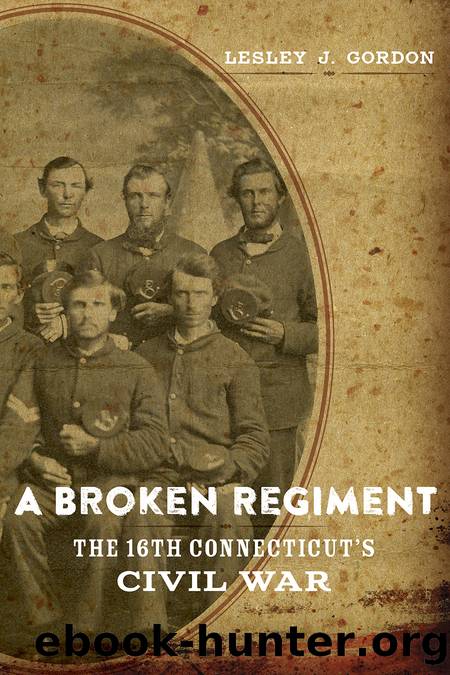A Broken Regiment by Lesley J. Gordon

Author:Lesley J. Gordon
Language: eng
Format: epub
Publisher: LSU Press
Published: 2014-10-15T00:00:00+00:00
âA LESSON IN PATRIOTISMâ
If their unheroic performance at Antietam could be recast as heroic, so too could their dehumanizing captivity at Andersonville. Members intent on recounting their individual and shared stories of imprisonment sought to emphasize not merely the horror but also a new brand of manly bravery. Robert Kellogg had published Life and Death in Rebel Prisons in 1865, dedicating it to the âBrave Menâ who perished âthrough unparalleled sufferingâ in prison. Others felt compelled to provide personal testimonies to ensure that the horrors would not be forgotten. Norman Hope presented his own âStory of Andersonvilleâ in a public forum in Manchester, Connecticut. He heralded all the prisoners as brave, âdemonstrating their valorâ and âtheir superior patriotism,â which he considered on par with that of all courageous Civil War soldiers. He denied that any of his comrades accepted the âthe safety and comfort proffered them by their enemyâ and declared that they âremained faithful to their colors until death.â Hope emphasized the unique valor of prisoners of war. âWe hear the prisoners of Andersonville described as heroes. They were heroes. Any man who enlisted and did service for his country was more or less a hero. But what of those poor unfortunates? In the midst of all the sufferings, temptations were put before the prisoners to induce them to desert their flag. But they remained firm and true.â Hope, like most of his other comrades, refused to acknowledge publicly that any Andersonville prisoners, let alone men in his own regiment, accepted Confederate paroles to work outside the pen or in the prison hospital to allay their condition.119
Members also refused to endorse southern apologists seeking to tone down the conditions they faced at Andersonville. George Robbins, who recorded his reminiscences in 1918, maintained, âA number of books have been written and published by men recounting not only their individual experiences but the conditions existing in this so-called Southern Military Prison, commonly known as the âBullpen.â None that I have read, and I have read most of them, exaggerate in the least degree the horrible conditions existing in the stockade.â120 George Whitney attacked the Southâs reclamation of Andersonville in a lengthy public address entitled âPrisons of the Confederacy.â He observed that âhistory is being taught in the schools of the south, making Traitors Patriots and Treason commendable which should I hope be counteracted.â âThere are,â he proclaimed, âmany mistaken ideas about Andersonville.â Whitney viewed not just Henry Wirz but other Confederate officials, such as John Winder, James Seddon, and Jefferson Davis, as guilty of cold-blooded murder. As a survivor of Andersonville, Whitney reflected that it was âhumiliating to humanity to know that men claiming to be civilized, boasting of chivalry and refinement beyond all the rest of the worldâ could âupon American soil be guilty of a barbarism such as has been sketched.â121
Telling their stories was important, but survivors wanted something more permanent to commemorate their terrible suffering at Andersonville. Encouraged by the success of other northern states in winning public
Download
This site does not store any files on its server. We only index and link to content provided by other sites. Please contact the content providers to delete copyright contents if any and email us, we'll remove relevant links or contents immediately.
In Cold Blood by Truman Capote(3365)
The Innovators: How a Group of Hackers, Geniuses, and Geeks Created the Digital Revolution by Walter Isaacson(3106)
Steve Jobs by Walter Isaacson(2876)
All the President's Men by Carl Bernstein & Bob Woodward(2357)
Lonely Planet New York City by Lonely Planet(2204)
And the Band Played On by Randy Shilts(2179)
The Room Where It Happened by John Bolton;(2140)
The Poisoner's Handbook by Deborah Blum(2123)
The Innovators by Walter Isaacson(2088)
The Murder of Marilyn Monroe by Jay Margolis(2085)
Lincoln by David Herbert Donald(1976)
A Colony in a Nation by Chris Hayes(1912)
Being George Washington by Beck Glenn(1869)
Under the Banner of Heaven: A Story of Violent Faith by Jon Krakauer(1779)
Amelia Earhart by Doris L. Rich(1680)
The Unsettlers by Mark Sundeen(1673)
Dirt by Bill Buford(1660)
Birdmen by Lawrence Goldstone(1650)
Zeitoun by Dave Eggers(1630)
